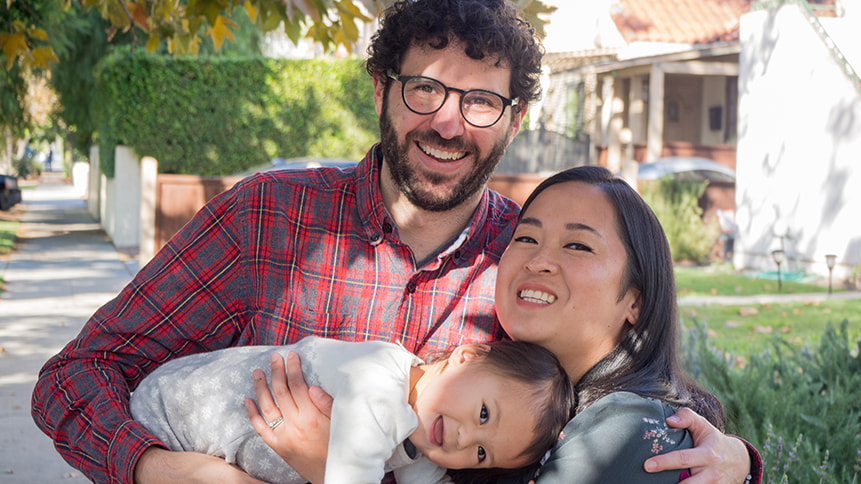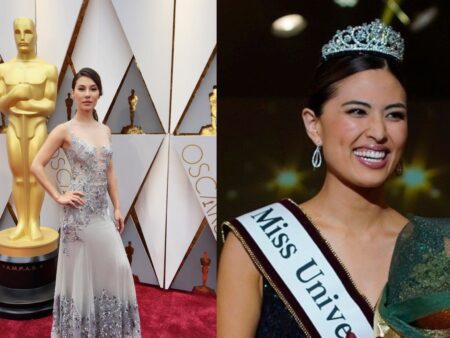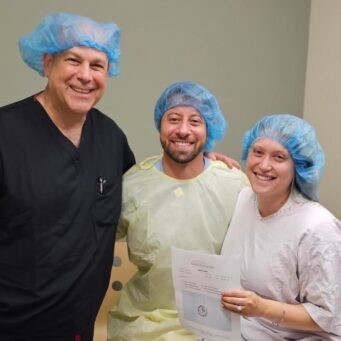
Anna Almendrala and Simon Ganz, hosts of the popular IVFML podcast on Huffington Post, met in their freshman year of college; but didn’t actually speak to each other before their third year of college, when they were in classes together. They married five years later, in 2010, and knew that they wanted to start a family.
Simon says, “Even as a teen, I was looking forward to the idea of a long term relationship and a family, so that idea of eventually having kids was something Anna and I felt compatible about from the very beginning.”
Since they were still young and wanted to have their first child by the age of 30, they didn’t start trying until they were 28 years old. Anna now says she’s glad they started even earlier than planned, since they never imagined it would take five years before their baby girl, now 20 months old, was born.
Now IVFML is in its second season, and Anna and Simon continue to tell the story of how infertility affects peoples’ lives. Here’s how it affected theirs:
Q: When did you realize infertility maybe an issue for you?
Anna – I had always suspected it could be a problem because I had been diagnosed with PCOS in my early 20s. But, it wasn’t until we started actively trying that I realized exactly how PCOS was a problem. If you can’t predict when your period will start, then you can’t guess when you’re ovulating! I would go two to three months without having a period at a time, and we were just lost.
Q: I know you’ve both covered the worst thing about being infertile. What was it for each of you?
Anna – I think for me, infertility activated a very deep sense of failure and inadequacy. My therapist told me that biological functioning like fertility, breast-feeding and other reproductive health issues can really upend a modern woman’s sense of herself and what she can achieve.
Before infertility, I was reasonably confident that whatever I set out to do, I would end up accomplishing. Infertility threw that confidence out the window — not just about my body, but about anything else I started doing.
Before infertility, I was reasonably confident that whatever I set out to do, I would end up accomplishing. Infertility threw that confidence out the window — not just about my body, but about anything else I started doing.
Another thing I wasn’t prepared for was the deep sense of fear that set in after our two pregnancy losses. I felt afraid to be alone, and there were several months afterward that I couldn’t go anywhere without Simon next to me.One of my friends even complained that she couldn’t get any alone time with me anymore! I said I was sorry but for some reason I was afraid to be somewhere without Simon, even if I were with other people I knew and loved.
Simon – I found the stakes and pressure of the fertility procedures to be exhausting. It felt like every month we were waiting for a result that could change our lives forever, and that went on every month for five years. At a certain point you just want to know your own future.
Q: Simon, you’re a comedy writer. Were you able to find humor through this crazy process? How/where? Anna, as a health editor, what have you seen change in the area of reproductive medicine since you underwent treatment?
Simon – There was definitely humor in the process, specifically for me with the culture and world of the infertility clinics. At a certain point I remember our fertility doctor advising Anna to eat lots of bananas and then a few months later, with no explanation, suddenly bananas were evil and forbidden. After awhile, all these random instructions that we dutifully followed began to feel darkly humorous to me. Like, even with all of our modern science, we’re all just cavemen waving sticks into the air to make it rain.
Anna – I think the most disturbing thing I’ve seen emerge since we did our first two rounds of IVF in 2015 are the questions around embryos deemed “abnormal” through genetic testing, but then have gone on to become healthy pregnancies and births. I understand the data shows that using these abnormal embryos will expose you to more risk of pregnancy loss, but as someone who tends to make more abnormal embryos than normal ones, it has me wondering if I should go against my doctor’s advice to implant one of these abnormal embryos.
After a while, all these random instructions that we dutifully followed began to feel darkly humorous to me. Like, even with all of our modern science, we’re all just cavemen waving sticks into the air to make it rain.
Q: You guys recently did an episode on the ‘why don’t you just adopt?’ question. Why was this important for you to cover?
Anna – I’m someone who’s interested in adoption in the future. It’s something my extended family has experience with in an informal way, and it doesn’t feel strange or scary to me. That said, it’s a completely different undertaking than infertility treatment, and it’s irritating and ignorant for people to suggest that adoption is an obvious and easy choice for couples to make. It was also the number one question we, and a lot of infertile couples have to answer over and over again.
I hate the suggestion to “just adopt” because it ignores the fact that adoption is a trauma for the children and their biological parents. The suggestion to “just adopt” implies that this trauma is somehow the solution to our own sense of loss. Adoption — foster care especially — is an act of radical hospitality and love. It’s not something that should be undertaken out of grief or a sense of obligation. And by the way, it’s something that ANYONE can do — not just infertile people.
Simon – For me it was important because a lot of the negative commentary I see online about fertility treatments is centered on adoption. There’s this idea that infertile people are throwing money away while children in need suffer. And that really bugged me. Because why does wanting a biological child suddenly become selfish just because you need help to make it happen? The desire for genetically related offspring is something so basic that every living being on the planet, from bacteria to flies to whales to people, tries to do it. And I think shaming people for having that same universal desire is ridiculous.
Click here to hear an episode of IVFML about surrogacy with pregnantish Founder, Andrea Syrtash.

Listen to stories, share your own, and get feedback from the community.


















